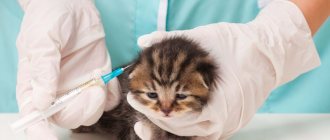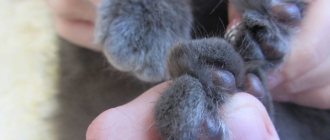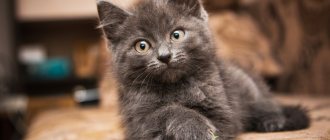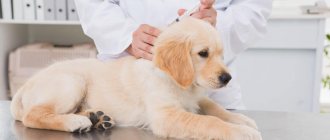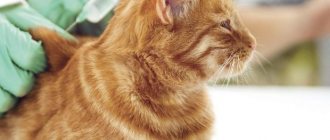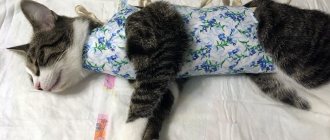List of standard vaccinations and schedule
Every pet must be vaccinated against the following diseases:
- Panleukopenia (in common parlance – plague). This is the most dangerous disease, often leading to death. It affects cardiac and respiratory functions.
- Viral tracheitis. This disease affects the respiratory system. It is accompanied by rhinitis, conjunctivitis and discharge from the sinuses. This disease is fatal.
- Chlamydia. With the disease, respiratory and visual function are impaired. Sometimes there is a disorder of the digestive system. As a result, the pet becomes infertile or dies.
- Calicivirus infection. It is difficult to treat, since the pathogen can mutate. Signs of the disease are cramps and lameness, accompanied by a cold.
- Rabies. The disease is dangerous both for the animal itself and for its owner. Such infectious diseases are the most dangerous for a kitten, for this reason vaccinations should be done first.
Currently, there are two types of animal immunization:
- a set of vaccinations against 4 major ailments;
- separate injection for rabies.
Vaccination is carried out only if the cat is completely healthy; for this reason, it needs to be examined by a veterinarian. It is possible that the animal may have a personal intolerance to the injected drug, but the injection will still have to be given. This will help your pet suffer from the disease in a less tragic way.
Also read the article about vaccination of adult cats.
What are kittens vaccinated against?
The immunization schedule is as follows:
- The first vaccination is given to a kitten at 2 months;
- the second – at 3 months of age;
- the third – at the age of 1 year.
In the future, vaccination is carried out annually, and the injections must be renewed each time.
This scheme should be followed from birth until the moment the animal dies. This way the pet can live for a very long time. To easily track the time of vaccine administration, you can purchase a special diary at the veterinary hospital.
VACCINATION ALGORITHM
The tactics of preventive vaccination of dogs and cats are the SAME
PRIMARY PREVENTIVE VACCINATION OF CHILDHOOD ANIMALS
- THREE TIMES, starting from 8 weeks, with an interval of 3 - 4 weeks.
- Rabies: ONE TIME, in the last (third) vaccination of the childhood cycle.
- When the interval between revaccinations increases to six or more weeks, the cycle of childhood vaccines begins anew (two-fold complex).
- The next vaccination after the childhood cycle is carried out AFTER one year
(complex with rabies), then - ANNUALLY (complex with rabies). - It is optimal to recommend vaccination against leptospirosis 6 months after completing a set of childhood vaccines and then every six months.
- Cats: RCP 8 - 9 weeks; RCP 12 - 13 weeks; RCP + R 14 – 16 weeks
ANNUAL PREVENTIVE VACCINATION OF ADULT ANIMALS
- ANNUALLY, complex with rabies.
- In case of missing the next vaccination, even if the last vaccination was performed several years ago, we vaccinate ONCE
PREVENTIVE VACCINATION OF ANIMALS WITH AN UNDETECTED VACCINAL HISTORY
- QUARANTINE 14 days!!!
- During this time, anthelmintic therapy was administered twice.
- Primary TWICE vaccination with an interval of 3 - 4 weeks if the animal is older than 3 months.
- Primary THREE vaccinations with an interval of 3 - 4 weeks if the animal is younger than 3 months.
- The rabies vaccine is administered ONCE during the second (or third) vaccination.
LEPTOSPIROSIS
- We strongly recommend vaccination every 6 months, especially for hunting dogs.
CONTRAINDICATIONS TO PREVENTIVE VACCINATION
- Clinical signs of infectious/invasive disease
- Chronic viral infections in cats
- Pregnancy
- Immunosuppressive therapy
- Vaccination is not advisable at less than 8 weeks of age and within 2 weeks after the use of immune sera
- Deworming is important, especially for children's animals. However, the lack of deworming is not a contraindication to vaccination, especially for adult animals.
- Dermatophytosis and demodicosis are NOT contraindications to vaccination.
EMERGENCY VACCINATION AGAINST RABIES
- It is carried out if an animal that has applied for an appointment, which has NOT been vaccinated against rabies within the last year, has been bitten by another animal with an unknown history; or if the vaccination history of the bitten animal is unknown.
- There are no contraindications.
- It is advisable to perform if the injury period does not exceed 48 hours.
SELECTION OF INJECTION SITE
- SUBCUTANEOUSLY, in the CHIB area
- SUBCUTANEOUSLY, in the WITHERS area
- Subcutaneously in the tail area?
- Change of pelvic limb for EACH
- No change of injection site is required. subsequent vaccination
- Mandatory marking of the injection site in the vet. passport (letters L or R)
POST-VACCINAL SARCOMA OF FINES
- We inform owners about the possibility of such a complication!!!
- If a lump forms at the injection site, follow-up for 2 months.
- If the tumor persists or grows during the observation period, see a therapist and undergo a fine-needle biopsy.
Primary vaccination and its distinctive features
From the age of 2 months, each kitten needs to be vaccinated regularly. At earlier stages, vaccinating an animal is pointless, since the body will not develop the required immunity. Primary immunization is necessary so that the pet’s body learns to resist many pathogens. This will help improve the health of the four-legged animal and also prolong its life.
Immunization is a strong stress for the baby's body. To avoid possible consequences, it is recommended to give the injection at home. In a familiar environment and next to the owner, the cat will tolerate this procedure more easily.
Before vaccinating a kitten for the first time, the possibility of contact with sick relatives should be excluded. If the baby interacts with an infected animal, immunization must be rescheduled.
This requirement also applies to pets who have undergone surgery. Primary vaccination for a four-legged friend is allowed only 25 days after surgery.
If a cat's baby teeth are replaced by permanent ones, the injection should be carried out after they are completely replaced.
Primary vaccination can provoke the development of adverse reactions in the form of lethargy, drowsiness, loss of appetite, loss of interest in games. This phenomenon is a normal reaction of the body to the administered drug.
If the baby refuses food for more than 24 hours, there is an increase in temperature and indifference, you urgently need to seek help from a veterinarian.
Should a kitten be vaccinated: pros and cons of vaccination
Many kitten breeders are convinced that if their pet lives in an apartment or private house, does not go outside and does not have contact with other animals, then there is no need to vaccinate. Is it really? It is important to understand that not only a street kitten, but also a domestic kitten can become infected with infectious diseases. This can happen under the following circumstances:
- through objects brought in from the street, human shoes, which may contain pathogenic microorganisms;
- owner's dirty hands;
- grass that a person will bring to a kitten from the street;
- in the veterinary clinic during the examination.
There are many risks of kittens contracting dangerous diseases, so it is better to prevent them in a timely manner. Among the positive aspects of vaccination are:
- creating a reliable immune response in the kitten’s body;
- the ability to freely take your pet outside the country;
- a necessary condition for participation in exhibitions;
- compliance with the rules of breeding purebred cats;
- protection of the offspring of vaccinated kittens in the first months after birth;
- the opportunity to let the kitten outside, walk with it in the park, at the dacha.
What are the disadvantages of vaccination? These include unnecessary financial expenses and the likelihood of your pet developing post-vaccination complications.
Age for rabies vaccination
Immunization against rabies is carried out for the baby at the age when communication with other animals begins (at about 3 months).
In cases where the cat practically does not communicate with its relatives, the vaccine is administered at 6-8 months of age.
Re-vaccination is carried out annually at approximately the same period.
Usually, an anti-rabies injection has a strong effect; as a result, after vaccination, the baby becomes lethargic and weak, in addition, the temperature rises for a couple of hours.
Risks of vaccination
Although there are some risks associated with vaccination, they are relatively rare.
Vaccine reactions and side effects are usually minor and often resolve on their own. These may include pain and swelling at the injection site, lethargy, or mild fever. Severe allergic reactions are less common but can be fatal if left untreated. If your kitten develops hives, swelling of the face, or difficulty breathing, contact your nearest open veterinary clinic immediately.
Because vaccines stimulate the immune system, there is a small risk of developing an autoimmune disorder.
This is extremely unusual considering the number of animals affected compared to all animals that were vaccinated. However, autoimmune disorders can be serious and difficult to treat. Conditions that may occur include blood disorders, neuromuscular problems, and even skin problems.
Most veterinarians and pet experts agree that the benefits outweigh the risks when it comes to vaccines, especially for young animals. When it comes to adult cats, many veterinarians follow protocols that require vaccinations less frequently. Once given annually, some vaccinations for adults are more often recommended every three years, other than the mandatory annual rabies vaccination.
Key requirements for immunization
When immunizing a kitten, you should follow some rules:
- the drug can only be administered to a completely healthy pet;
- Injections are prohibited for a kitten after communicating with infected relatives;
- after immunization, surgical intervention is contraindicated for 21-25 days;
- after surgery, vaccination is not carried out for at least 21 days;
- if antibiotics are used for therapy, administration of the medication is allowed after 2 weeks;
- It is forbidden to vaccinate your pet when changing teeth;
- the vaccine should not be expired;
- It is contraindicated to vaccinate pets under 2 months of age;
- During the procedure, the baby must be calm.
Basic rules for vaccinating kittens
Before vaccinating your pet, you need to make sure he is in good health:
- the kitten should be cheerful and cheerful;
- body temperature does not exceed 38-39ᵒC;
- the animal is not sneezing or coughing;
- no discharge is observed from the nose and eyes;
- the animal has an excellent appetite;
- Kittens over 2 months of age are subject to vaccinations;
- communication between the animal and sick, suspicious, unvaccinated relatives is completely excluded.
The animal should not have parasites - fleas and worms. To kill fleas, special drops and collars for kittens are used, and anthelmintics are used to combat helminths. If you suspect your kitten has worms, do not self-medicate, but contact your veterinarian.
Find out also about other ways to remove fleas from a kitten>>>
If the kitten has undergone surgery, vaccination cannot be performed.
If there is no information about whether the animal has been vaccinated previously, it is considered unvaccinated and is subject to re-vaccination. This will not cause any harm to your health, the main thing is to withstand quarantine for 2 weeks after acquiring the pet.
Each animal owner must obtain a veterinary passport, which will record all the vaccinations given to the kittens, the vaccination schedule and the name of the drugs. The veterinarian draws up a vaccination schedule for each animal separately, based on the age, general condition and individual characteristics of the pet’s body.
To choose effective vaccines that are mandatory for vaccination, it is important to adhere to some rules:
- For immunization of kittens, it is better to give preference to an imported drug, since it has a milder effect on the young body.
- Vaccinations must be given strictly according to the instructions given for the drug.
- It is necessary to make sure that the drug has not expired.
- Only an experienced veterinarian should carry out vaccinations; mistakes during vaccinations are unacceptable.
- After vaccination, you need to observe your pet for half an hour to avoid allergic reactions.
Possible consequences after vaccination
After immunization, some unpleasant consequences are possible:
- lethargy;
- lack of appetite;
- elevated temperature;
- pain at the injection site;
- encephalitis;
- polyneuritis;
- arthritis;
- convulsive conditions;
- changes in behavior;
- loss or change in hair color in the area where the medication was administered.
Increased sensitivity to the vaccine and immune reaction may manifest itself as:
- inability to develop immunity after injection;
- tumors at the injection site;
- reactions caused by incorrect or untimely vaccination.
When and what vaccinations do cats get?
For preventive immunization of cats and other warm-blooded animals, poly-monovalent live, inactivated vaccines of foreign and domestic production are used. Vaccination should be carried out in a veterinary hospital, since only clinically healthy animals can be vaccinated. The veterinarian will draw up an optimal schedule of vaccinations, revaccinations, and select a veterinary drug, taking into account the age and individual characteristics of the furry pet. The cost of immunization depends on the type of vaccine, the price list of veterinarian services, and the price of a veterinary passport.
Kittens are given their first vaccinations at eight to ten weeks of age. Until this moment, babies receive protective antibodies from their mother cat. Starting from two months of age, immunity weakens, and the risk of infection by pathogenic agents increases.
After the first vaccination is given, the second kittens are vaccinated two weeks later. The third vaccination is given a month later.
Vaccination schedule up to a year
Kittens must be vaccinated against:
- rabies;
- viral rhinotracheitis;
- enteritis;
- panleukopenia (feline distemper);
- calcivirosis.
- chlamydia;
- viral leukemia;
- trichophytosis;
- microsporia.
The above diseases are considered deadly (chlamydia, rabies, leukemia) and can cause serious complications in the body and cause the death of a pet.
For immunization of cats use:
Nobivak Triket (polyvaccine against rhinotracheitis, panleukopenia, calcivirosis).
- Multifel.
- Nobivak Rabies (for rabies).
- CaliciVax (monovaccine against calvirosis);
- Leukocel (monovaccine for leukemia).
- Felovax-4 (calcivirosis, rhinotracheitis, panleukopenia).
- Leucorifelin (inactivated polyvaccine).
- Quadricate (France).
- Multifel-4 (chlamydia, rhinotracheitis, panleukopenia, calcivirosis).
The following vaccines are used for cats against microsporia and trichophytosis: Vakderm, Polivac TM, Microderm. Kittens are vaccinated up to 6 months of age.
Vaccines for cats Walking cats are vaccinated against rabies annually, and domestic cats, depending on the veterinarian, every two to four years. Kittens are vaccinated against this deadly disease at the age of 12-13 weeks or after the change of milk teeth.
After immunization, specific immunity is formed in the animals' bodies in about 15-20 days. Subsequent revaccinations are carried out annually for cats walking on the street or once every two to three years for pets who do not leave the house or apartment. The same injection drugs are used as for preventive immunization.
All vaccinations are recorded in the veterinary passport, veterinary certificate of animals with a stamp and signature of the veterinarian.
How does the pet behave after manipulation?
Traveling to a veterinary hospital, unfamiliar aromas and people, and, in addition, unpleasant manipulation, are stressful for the animal, especially when it has not been taken out of its home before.
After returning from the hospital, the kitten may refuse food and play, hide in a secluded place and sleep for some time. After getting up, you need to offer your pet a small amount of his favorite treat.
The next time he refuses, you shouldn’t force him. Probably, the first day after vaccination the baby will only drink. You need to make sure that there is enough fresh water in the bowl.
During the first two days, you should not ventilate the room where the kitten is - due to a weakened immune system, it can easily catch a cold.
What is vaccination
Vaccination is the administration of a drug to an animal that is based on pathogenic bacteria or viruses. In advance, pathogenic microorganisms are artificially weakened or killed. They are introduced into the animal’s body to develop immunity to the disease carried by certain microbes. Vaccination can often save a pet's life. But do not forget that vaccination can cause complications and various undesirable effects.
Why are cats vaccinated?
Vaccinating a cat is a measure aimed at preventing possible disease. Vaccination prepares the animal to encounter harmful microorganisms by developing immunity in advance.
A virus or microbe that enters an animal’s body and begins to develop in it causes irreparable harm to vital systems. To neutralize them, the immune system begins to produce antibodies. This may take a long time, during which the pathogen already affects the body and causes irreparable harm.
It happens that the immune system cannot produce enough antibodies to neutralize pathogens. This is where vaccination comes to the rescue. Through an injection, inactive antigens (foreign substances) are introduced into the cat's body, which provoke the body to an immune response. When the immune system subsequently encounters these bacteria or viruses, it already has antibodies in its arsenal that can quickly overcome the disease without critical consequences.
Antibodies have specificity: they can neutralize only those antigens in response to which they were produced by the body
But the memory of immunity is not eternal, so revaccination (re-vaccination) is needed, which prevents the antibodies from disappearing.
Video: antigen and antibody - how the immune system works
Any owner should know that no vaccine can provide a 100% guarantee against infection. But this fact should not become an obstacle to vaccinating an animal. This is justified by the fact that a vaccinated animal has a minimal chance of getting sick, and if it does get sick, the course of the pathology is much easier and has no lethal consequences.
Mr. Cat advises: the most famous drugs for vaccination
The following products are used to immunize kittens:
| Name of the drug and for what ailments | At what age is it introduced, in weeks? | Re-introduction |
| Nobivac Tricat. Complex barrier against rhinotracheitis, calicivirus infection, plague. | 9-12 | After 21 days |
| Nobivac Rabies. Against rabies. | 12 | Not required |
| Quadricat. A comprehensive barrier against disease and rabies. | 12 | After 12 months, however, the rabies component is excluded |
| Eurifel RCPFeL.V. Cumulative protection and feline viral leukemia. | 7 | In 5 weeks |
A comprehensive barrier against three diseases and chlamydia:
| 7-8 | After 28 days |
| 8 | ||
| 8-12 | ||
| 10 |
| |
| Primucell FTP. A drug against infectious peritonitis. | 16 | After 28 days |
| Vakderm F. Protection against microsporia trichophytosis. | 6 | After 14 days |
| Microderm. A drug for lichen. | 6-8 | After 21 days |
| Polivak TM (for cats). Protection against dermatoses. | 10-12 | After 5 weeks |
When to get your first vaccination
The first vaccination for small kittens is given at the age of two months. This is the optimal period when maternal immunity ceases to operate and the little tomboy’s body is already strong enough to form vaccine protection. It is not advisable to vaccinate a kitten yourself. This should be done by a specialist. After the injection, information about the date of vaccination, type of vaccine, series and dose will have to be entered into the animal’s special vaccination certificate.
The first immunization allows you to inoculate the kitten with immunity against several infections, in particular, calicivirus, parvovirus enteritis or canine distemper, and rhinotracheitis. He needs a second injection of the vaccine, which is carried out 7 and 21 days after the initial injection.
Immunizing your pet before traveling
When planning a trip with your pet, you need to get a certificate from the veterinarian with information about the vaccination performed. Such documentation will be needed to purchase a ticket for any public transport traveling long distances.
The immunization document must be issued in accordance with the law and include information about the vaccinations given to the cat. If the trip is made to another region of the state, obtaining a certificate from a veterinarian is an indispensable condition.
Vaccination of Scottish and British kittens
The Scots and the British are artificially bred breeds of cats, as a result of which they have almost no immunity of their own. Therefore, it is necessary to introduce all the required vaccines in childhood, since the possibility of infection is very high.
Although pets of such breeds are ornamental animals that rarely leave their homes, immunization must be taken seriously. These kittens do not need any special vaccinations. The drugs are suitable for any four-legged friend.
At what age are the first and subsequent ones done?
The first complex vaccination is recommended for kittens between 2 and 3 months of age.
After 3 weeks, veterinarians advise revaccination. Important! When revaccinating, it is better to use the same vaccine as during the initial vaccination. Next, you should endure a two-week quarantine, since only after 14 days will the kitten develop stable immunity to diseases
At the owner's request, the veterinarian can additionally administer a vaccine against feline chlamydia
Next, you should endure a two-week quarantine, since only after 14 days will the kitten develop stable immunity to diseases. At the owner's request, the veterinarian can additionally administer a vaccine against feline chlamydia.
The next stage is vaccination at the age of 1 year, after which revaccination is carried out annually.
Important! If you were unable to vaccinate your kitten before six months, you should not inject the animal again. By this age, the animal’s immune system has become sufficiently strengthened, so revaccination is no longer necessary.
After the first injection, the vaccine is given within 1 year.
Types of vaccinations for kittens:
- complex – against 4 diseases;
- single – against rabies.
Note! Injections are given only to healthy animals, but this does not guarantee that the kitten may become ill. However, the disease will pass easier, and the likelihood of death is reduced to zero
If an adult cat has never been vaccinated, then the first vaccination should be given 2 times with a break of 3-4 weeks, in order to carry out annual procedures in the future.
The small age and breed of kittens is not an obstacle to vaccination, but 2 weeks before the procedure, the pet’s body should be cleansed of parasites (worms and fleas). Only after complete cleaning can you take the kitten to the veterinary clinic.
Vaccination information should be entered in the animal’s medical passport. In addition to the date of its implementation, you need to indicate the name of the administered drug, its series and number, which will allow you to control the timing of vaccinations and revaccinations.
